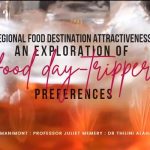
🎉 Hot off the press! We’re thrilled to share that our latest research paper has been published in the Leisure Studies Journal. The journal is Open Access, hence feel free to share with any foodies around the world! This study is part of our Bournemouth University ACORN-funded project, with support and contributions from my amazing work mentor, Professor Juliet Memery, and a great colleague of mine back in Australia, Dr Thilini Alahakoon. A big shoutout to the ACORN panel and BUBS QR panel for their support throughout this research journey.
To make this exciting news even more fun, let’s pretend we’re being interviewed by a curious foodie journalist!

Disclaimer: I’ve included some delicious-looking photos from my recent trip to France. Even though I was short on time, I made 100% of the effort to visit all the food places on my list
Journalist: Congratulations on your publication! Can you tell us what your research is all about?
Us: Thank you! We’re really excited about it. Our research applies this theory to food tourism, revealing some interesting decision-making patterns when it comes to food travelling. We have looked into three main areas here: What makes a regional food destination attractive to food travellers. How personal values influence our food destination choices. The hidden connections between what we eat, who we are, and where we go.
Journalist: That sounds fascinating! I’ve heard of “distance decay theory.” How does it relate to food tourism?
Us: Great question! Distance decay theory suggests that as the physical distance and time required to reach a destination increase, its attractiveness tends to decrease. This is especially relevant when time is limited. Imagine you’re pressed for time; that nearby food truck suddenly looks way more appetising than a cross-country culinary adventure – essentially, closer is cooler.
Journalist: How do personal values come into play when choosing food destinations?
Us: Personal values like comfort and convenience often win out over novelty and extravagance. When you’re short on time, you’re more likely to choose a place that’s familiar and easy to get to rather than going out of yourway for a new experience. It’s like sticking with a favourite restaurant because it’s reliable and you know what to expect. Our research also developed a Hierarchical Values Map (HVM) that links salient attributes to their consequences and underlying personal values. This map helps us understand how attributes such as convenience and familiarity translate into desired outcomes and how they align with individual values.
Journalist: What do these findings mean for destination marketing organisations (DMOs)?
Us: These insights are crucial for DMOs. Understanding that travellers often prioritise proximity and comfort allows marketers to better tailor their strategies and framing promotional messages. It’s about balancing the appeal of local, familiar spots with the desire for unique culinary experiences. This holistic approach can enhance the overall visitor experience, encouraging travellers to return for more than just the cuisine, thereby fostering sustainable tourism growth.

Hopped on a train, and 20 minutes later, I arrived in Saint Emilion. A 20-minute walk from the station, soaking up enough vitamin D to last me a year.
Journalist: What are the next steps for this project?
Us: The next step is to get another paper published (fingers crossed!). Our next paper is centred around diving deeper into how different attributes influence destination preferences, providing even more nuanced insights into traveller behaviour. This can help refine marketing strategies further and better meet the needs of food travellers.
Journalist: Food for thought?
Us: Absolutely! Our findings explain why, despite our love for exotic cuisines, we often find ourselves drawn to closer, more familiar food destinations. It’s a balance between our culinary aspirations and practical considerations. So next time you’re choosing between the new place across town and your favourite local spot, you’ll understand why your brain might say, “let’s stay close to home.” Interested in our paper? – you can visit the link here to read more about it.
Reference:
Manimont, G., Memery, J. and Alahakoon, T., 2024. Food day-trippers’ perceptions of regional food destination attractiveness: an application of distance decay theory. Leisure Studies. https://doi.org/10.1080/02614367.2024.2376824
 ACORN funded research project presented at the International Food Marketing Research Symposium in Prague
ACORN funded research project presented at the International Food Marketing Research Symposium in Prague










 Dr. Chloe Casey on Sky News
Dr. Chloe Casey on Sky News Final Bournemouth University publication of 2025
Final Bournemouth University publication of 2025 On Christmas Day in the Morning…
On Christmas Day in the Morning… New Nepal scoping review on maternal & neonatal health
New Nepal scoping review on maternal & neonatal health ECR Funding Open Call: Research Culture & Community Grant – Application Deadline Friday 12 December
ECR Funding Open Call: Research Culture & Community Grant – Application Deadline Friday 12 December MSCA Postdoctoral Fellowships 2025 Call
MSCA Postdoctoral Fellowships 2025 Call ERC Advanced Grant 2025 Webinar
ERC Advanced Grant 2025 Webinar Horizon Europe Work Programme 2025 Published
Horizon Europe Work Programme 2025 Published Horizon Europe 2025 Work Programme pre-Published
Horizon Europe 2025 Work Programme pre-Published Update on UKRO services
Update on UKRO services European research project exploring use of ‘virtual twins’ to better manage metabolic associated fatty liver disease
European research project exploring use of ‘virtual twins’ to better manage metabolic associated fatty liver disease